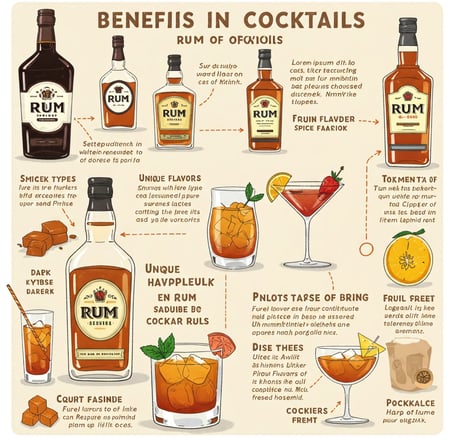The Benefits of Rum in Cocktail Making
Rum is one of the most versatile and beloved alcoholic beverages in the world. With its deep roots in the history and culture of many regions, especially the Caribbean islands and Latin America, rum is not only a refreshing drink, but also an excellent base for cocktails. In this article, we will explore the benefits of rum in cocktails, highlighting its unique flavor, versatility and how it can be a more conscious option compared to other alcoholic beverages.
CURIOSITIES
3/27/20254 min read


History and Origin of Rum
Rum, a very popular distilled beverage, has its roots in the Caribbean islands, where its production process began in the 17th century. It is believed that the first records of rum date back to the island of Barbados, where sugar cane was cultivated in abundance. Colonists discovered that molasses, a byproduct of sugar production, could be fermented, creating an alcoholic beverage. This discovery not only revolutionized the consumption of beverages, but also provided a new source of income and trade for the Caribbean colonies.
Over time, rum began to spread throughout the Americas and Europe, becoming a drink enjoyed and consumed in various cultures. During the 18th and 19th centuries, rum established itself as an essential drink in social life, especially among sailors and pirates. These associations helped to reinforce the image of rum as a bold and adventurous drink that symbolized freedom and exploration.
In addition to its popularity among sailors, rum also has a rich diversity of styles and flavors, reflecting local traditions and regional characteristics. It is common to find different varieties of rum, including white rum, which is light and ideal for cocktails; aged rum, which gains complexity and flavor through a maturation process in wooden barrels; and flavored rum, which incorporates flavors of fruits and spices. These variations not only highlight rum’s versatility in cocktails, but also its ability to adapt to local preferences and the global market, making it a truly universal drink.
The Unique Flavor of Rum
Rum is a distilled beverage with a remarkably diverse flavor profile, which makes it a popular choice in cocktails. This distillate is derived from sugar cane, and its flavor is influenced by multiple factors, including the method of production, place of origin, and aging techniques. This variety of influences is what gives rum its distinct aromatic and flavor notes.
The flavor notes of rum can vary considerably. For example, rums from the Caribbean region often have fruity flavors, such as pineapple and banana, accompanied by warm spice notes. In contrast, rums from countries such as Brazil can have more earthy characteristics, with hints of vanilla and honey. This diversity of flavors is the result of different fermentation and distillation methods, which allow the extraction of various nuances from the sugar cane.
Fermentation, a crucial step in the production of rum, can be carried out in several ways, directly influencing the flavor profile. Longer fermentations tend to result in rums with more complex flavors, while faster fermentations can produce a lighter, fresher product. Distillation, in turn, is a process that can be carried out in pot stills or column stills, each method in its own way contributing to the purity and crispness of the final flavor.
Furthermore, aging in oak barrels is a key factor in developing flavor character. Barrel-aged rums acquire notes of caramel, wood, and even dried fruit, enriching the consumer experience. Iconic examples include Jamaican rum, which tends to be more robust and full-bodied, and Martinique rum, which is often more floral and light, each offering a unique taste experience.
Rum’s Versatility in Cocktails
Rum is one of the most versatile spirits used in cocktails, offering a wide range of flavors that can be combined with a variety of ingredients. This diversity allows rum to be the base of classic cocktails, such as the Mojito, which highlights its ability to harmonize with the freshness of mint and the acidity of lime. Another emblematic example is the Daiquiri, where rum is combined with lime juice and sugar, resulting in a balanced and refreshing drink.
The versatility of rum is also evident in contemporary cocktails that explore new flavor combinations. For example, the Rum Sour, which can incorporate ingredients such as orange or even spices, broadens its range of flavors. In addition, the use of aged rum in sophisticated cocktails, such as the Old Cuban, which includes champagne and mint, shows that this drink can be adapted to more elegant contexts.
By mixing rum with fruits, herbs and spices, cocktailmakers have a multitude of interesting combinations at their disposal. Ingredients such as pineapple, ginger and even pepper can complement and enhance the exotic notes of rum, adding unique characteristics to each creation. Exploring different types of rum, such as white, gold and dark, is also crucial. Each type has distinct properties that can enhance specific flavors in a cocktail. For example, a dark rum tends to have richer and more complex notes, while a white rum is generally lighter and ideal for mixing.
In this way, rum’s versatility in cocktails not only enriches the tasting experience, but also enhances the art of creation, allowing bartenders and enthusiasts to constantly experiment and innovate. With its varied combination options and possible presentation styles, rum is solidifying itself as a preferred option in modern mixology.
Rum as a Conscious Choice in Alcohol Consumption
In recent years, rum has emerged as a more conscious choice among the alcoholic beverage options available on the market. One of the main factors contributing to this perception is the growing trend towards sustainable production. Many rum producers have adopted practices that respect both the environment and local communities. For example, by choosing organically grown sugar cane, these distilleries not only ensure a higher quality product, but also minimize their environmental impact.
In addition, supporting small distilleries has become increasingly popular among consumers. Choosing rum from small brands that use artisanal methods and natural ingredients means supporting the local economy and contributing to fair trade practices. These producers often value transparency, allowing consumers to know where their products come from and how they are made, resulting in a more authentic and meaningful experience.
Another aspect to consider is the impact of responsible consumption. Rum, when consumed in moderation, can be a healthier alternative to other alcoholic beverages such as vodka or gin, especially when incorporated into cocktails that use fresh, natural ingredients. Making a conscious choice of spirits can positively influence not only individual health, but also collective health. Therefore, when choosing rum as the main ingredient in a cocktail, you are making a choice that respects flavor and quality, while promoting more sustainable and responsible consumption practices.
Check out our recipes made with rum!


